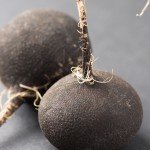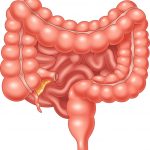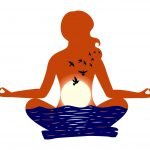Prayer as Medicine: Faith and Controversy
Ronald Steriti, ND, PhD
The most beautiful thing we can experience is the mysterious. – Albert Einstein
Several studies have shown that prayer is associated with positive health effects. For example:
- A recent study published in Support Care Cancer found that women who prayed were able to find more positive contributions from their cancer experience than women who did not pray (Levine et al., 2009).
- A study published in the American Journal of Health Promotion found that those who pray had more favorable health-related behaviors, preventive service use and satisfaction with care (O’Connor et al., 2005).
- Several studies show that attendance at religious services or reading the Bible has been associated with reduced mortality (Hummer et al., 1999; Helm et al., 2000; Hummer et al., 2004).
- Religious intervention such as intercessory prayer may improve success rates of in vitro fertilization, decrease length of hospital stay and duration of fever in septic patients, increase immune function, improve rheumatoid arthritis and reduce anxiety. Frequent attendance at religious services likely improves health behaviors. Moreover, prayer may decrease adverse outcomes in patients with cardiac disease (Coruh et al., 2005).
See Table 1 for these and other studies regarding prayer and health effects.
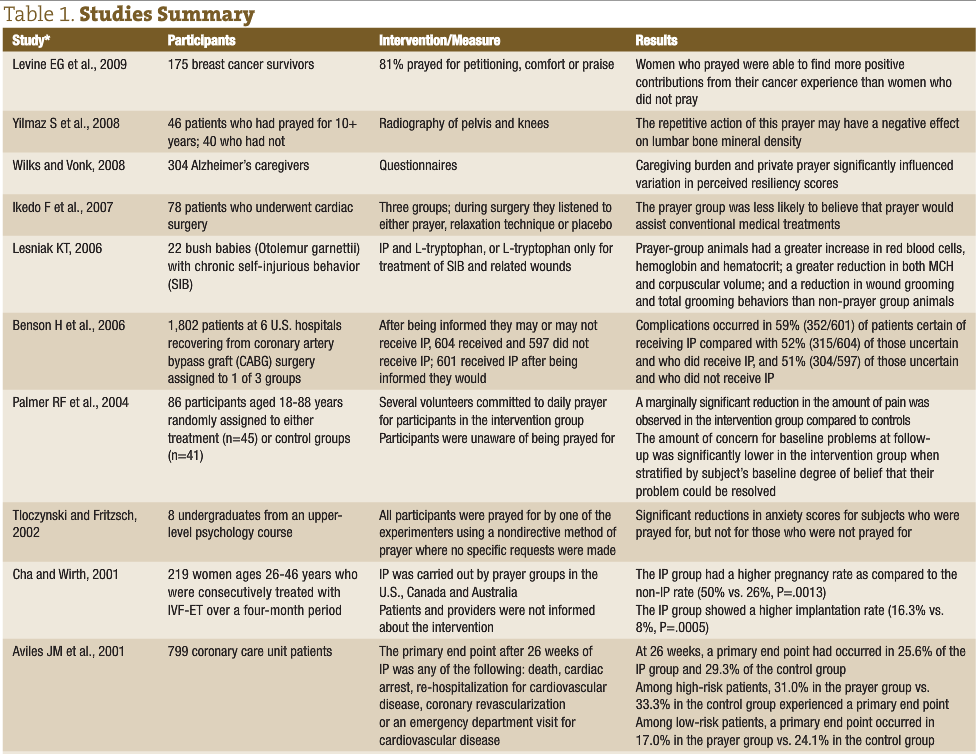
Intercessory prayer (IP) is the act of praying on behalf of others.
- A recent article published in Cochrane Database of Systematic Reviews found mixed results from intercessory prayer (Roberts et al., 2007).
- Intercessory prayer had a positive effect on women undergoing in vitro fertilization (IVF) treatment. The distant IP group had significantly more successful implantations than the group without IP (Cha and Wirth, 2001).
- Another study published in the American Heart Journal showed a negative effect. Those aware of receiving prayer had significantly more post-operative complications than those who were uncertain whether they were receiving prayer, whether they actually received IP or not (Benson et al., 2006).
Controversy
The concept of prayer as medicine is fraught with controversy. An article published in the Journal of Medical Ethics (Turner, 2006) states that it “makes no ethical or methodological sense to study remote, intercessory prayer as if it were just another drug.” The author points out several flaws inherent in such studies:
- Several studies did not obtain informed consent of patients participating in the studies
- If the intercessors are conscientious religious believers, they should subvert the studies by praying for patients randomized to the control groups
- The studies were characterized by internal philosophical tension
An article by Gil Gaudia published in Medscape General Medicine (2007) had several interesting quotes:
- “By carrying out research into the effects of ‘intercessory prayer’ medical researchers are, in effect, attempting to study the existence of miracles, defined as an extraordinary event manifesting divine intervention in human affairs.”
- “It is disheartening to see the number of supposedly educated and intelligent professionals who are involved in the futile process of attempting to investigate that which cannot be part of the physical universe, and hence, not open to scientific examination.”
- “Scientists have no business wasting their time and money (and certainly not the taxpayers’ money where it is NCCAM-funded research) investigating ’that which has no existence whatsoever.’ In fact, in my opinion, those who do, should be labeled ’pseudo scientists.’”
A couple of other interesting quotes include:
- “These studies claim findings incompatible with current views of the physical universe and consciousness. Unless these problems are solved, studies of intercessory prayer should not be conducted” (Sloan and Ramakrishnan, 2006).
- “We live in an era of growing irrationalism, in which the most fundamental theories about the evolutionary basis of life on earth and the origins of the universe are under siege” (Sloan and Ramakrishnan, 2006).
Discussion
It can be argued that when certain beliefs are required, science becomes a religion. With regard to alternative medicine, there are two common pitfalls:
- Some allopathic medical doctors discount studies showing efficacy in vitamins or herbs because they do not believe in alternative medicine.
- Alternative medical doctors often discount studies showing a lack of efficacy in a vitamin or herb, especially if it is commonly used.
This article brings up another important and controversial topic: the belief that prayer is beneficial and no harm can be done by it.
One thing is certain, prayer as medicine is a controversial topic.
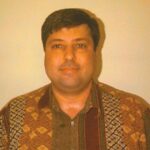 Ronald Steriti, ND, PHD is a graduate of SCNM. He is professionally trained in the use of vitamins, herbs, nutritional supplements and classical homeopathy, and is licensed as an ND by the state of Vermont. Dr. Ron’s passions are botani-cal medicine and clinical nutrition based on published scientific research, along with classical homeopathy. He has written extensive nutrition research articles on a variety of chronic dis-eases, and has developed a holistic medical database that keeps him up to date on the latest research
Ronald Steriti, ND, PHD is a graduate of SCNM. He is professionally trained in the use of vitamins, herbs, nutritional supplements and classical homeopathy, and is licensed as an ND by the state of Vermont. Dr. Ron’s passions are botani-cal medicine and clinical nutrition based on published scientific research, along with classical homeopathy. He has written extensive nutrition research articles on a variety of chronic dis-eases, and has developed a holistic medical database that keeps him up to date on the latest research
References
Aviles JM et al: Intercessory prayer and cardiovascular disease progression in a coronary care unit population: a randomized controlled trial, Mayo Clin Proc 76(12):1192-8, 2001.
Benson H et al: Study of the Therapeutic Effects of Intercessory Prayer (STEP) in cardiac bypass patients: a multicenter randomized trial of uncertainty and certainty of receiving intercessory prayer, Am Heart J 151(4):934-42, 2006.
Cha KY and Wirth DP: Does prayer influence the success of in vitro fertilization embryo transfer? Report of a masked, randomized trial, J Reprod Med 46(9):781-7, 2001.
Coruh B et al: Does religious activity improve health outcomes? A critical review of the recent literature, Explore 1(3):186-91, 2005.
Gaudia G: About intercessory prayer: the scientific study of miracles, MedGenMed 9(1):56, 2007.
Harris WS et al: A randomized, controlled trial of the effects of remote, intercessory prayer on outcomes in patients admitted to the coronary care unit, Arch Intern Med 159(19):2273-8, 1999.
Helm HM et al: Does private religion activity prolong survival? A six-year follow-up study of 3,851 older adults, J Gerontol 55A:M400-M406, 2000.
Hummer RA et al: Religious involvement and adult mortality in the United States: review and perspective, South Med J 97(12):1223-30, 2004.
Hummer RA et al: Religious involvement and U.S. adult mortality, Demography 36(2): 273-85, 1999.
Ikedo F et al: The effects of prayer, relaxation technique during general anesthesia on recovery outcomes following cardiac surgery, Complement Ther Clin Pract 13(2):85-94, 2007.
Lesniak KT: The effect of intercessory prayer on wound healing in nonhuman primates, Altern Ther Health Med 12(6):42-8, 2006.
Levine EG et al: The benefits of prayer on mood and well-being of breast cancer survivors, Support Care Cancer 17(3):295-306, 2009.
O’Connor PJ et al: Characteristics of adults who use prayer as an alternative therapy, Am J Health Promot 19(5): 369-75, 2005.
Palmer RF et al: A randomized trial of the effects of remote intercessory prayer: interactions with personal beliefs on problem-specific outcomes and functional status, J Altern Complement Med 10(3):438-48, 2004.
Roberts L et al: Intercessory prayer for the alleviation of ill health, Cochrane Database Syst Rev (2):CD000368, 2009.
Sloan RP and Ramakrishnan, R: Science, medicine, and intercessory prayer, Perspect Biol Med 49(4):504-14, 2006.
Tloczynski J and Fritzsch S: Intercessory prayer in psychological well-being: using a multiple-baseline, across-subjects design, Psychol Rep 91(3 Pt 1):731-41, 2002.
Turner DD: Just another drug? A philosophical assessment of randomised controlled studies on intercessory prayer, J Med Ethics 32(8):487-90, 2006.
Wilks SE and Vonk ME: Private prayer among Alzheimer’s caregivers: mediating burden and resiliency, J Gerontol Soc Work 50(3-4):113-31, 2008.
Yilmaz S et al: Effect of prayer on osteoarthritis and osteoporosis, Rheumatol Int 28(5):429-36, 2008.




